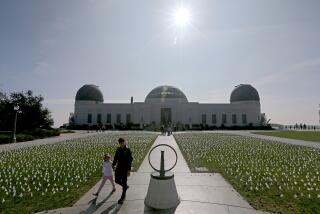Remember, Yes--but Celebrate? : Ceremonies to commemorate Nazi V-2 launchings are wholly unnecessary
- Share via
There will be ceremonies after all to mark the first firing of the Nazi V-2 rocket, 50 years ago, even though the German government has decided after a storm of protest to boycott the events.
The director of a small museum at the Peenemuende rocket testing site on Germany’s Baltic coast says that the ceremonies will proceed as planned this week, not--he says--to celebrate a military weapon that indiscriminately killed and wounded thousands of civilians “but rather to pay tribute to the start of outer space travel.” That distinction is certain to be lost on those who lived through the terror of the V-2 attacks on London, as well as on the few survivors among the 60,000 slave laborers at the Dora concentration camp who were forced to build Adolf Hitler’s “vengeance” weapons.
The outcry over the planned V-2 ceremonies echoes the controversy that arose earlier this year when a monument was unveiled in Britain to Sir Arthur Harris, who directed the Royal Air Force’s strategic bombing of Germany in World War II. That campaign included mass raids on a number of targets of marginal or indiscernible military significance--the ancient city of Dresden, most notably--which killed tens of thousands of civilians. It is notable that both the Dresden raids and the V-2 attacks came quite late in the war, when its outcome was clear and when no military advantage was to be gained by such actions.
Wars may indeed bring out the best as well as the worst in people, and memories of war can give rise to the most exquisitely sensitive as well as the most painfully insensitive forms of commemoration. The deliberate massacre of civilians is of course morally wrong no matter under what flag it occurs. So is any celebration of the means of such destruction, whether candidly acknowledged or in the guise of honoring a scientific feat.
It is astonishingly obtuse to pay homage to the V-2 rocket as a precursor of benign space travel, ignoring the suffering that is so much a part of its history. The 50th anniversary of World War II will be with us through 1995. Much remains to be recalled. Can we hope that from now on a humane and respectful awareness will shape what the world commemorates?
More to Read
Sign up for Essential California
The most important California stories and recommendations in your inbox every morning.
You may occasionally receive promotional content from the Los Angeles Times.













